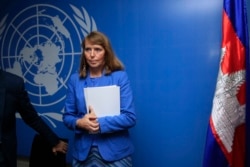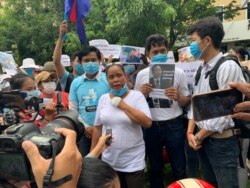A United Nations report to the Human Rights Council showed that its human rights activities and programs were subject to uninvited police presence and surveillance in Cambodia, with local rights monitoring groups facing similar adversities.
The findings were part of United Nations Secretary-General António Guterres’s report to the Human Rights Council, which will be submitted on Wednesday, detailing the intimidation and reprisals faced by individuals and groups working with the multilateral organization’s human rights programs across the world.
“In Cambodia, we continue to receive reports of acts of intimidation against civil society and human rights organizations, which impede their capacity to monitor and report – including to this Council,” reads the report’s case information for Cambodia.
The Office of the United Nations High Commissioner for Human Rights (OHCHR), the report states, had witnessed that local rights groups were reluctant to associate and advocate with them for fear of reprisals. It also noticed that prison detainees had also rejected assistance provided by the multilateral body.
The report refers to the August 2019 complaints received by Rhona Smith, special rapporteur for human rights in Cambodia, about local police arriving at civil society events and training sessions, where they would take photos and demand details of participants.
Additionally, the U.N.’s human rights office also reported police presence at a meeting organized by a local group and the U.N. country office, demanding a permit for the event. After consultations with Preah Sihanouk officials, the meeting proceeded, but the police arrived the next day asking for a list of participants and the agenda.
Similarly, the police attempted to photograph and get details of participants at OHCHR training for human rights defenders in Kampong Thom province in November 2019.
“Police officers arrived at the premises and demanded to see the training agenda and list of participants, and attempted to take photographs of participants,” reads the report.
Sok Ratha, Kampong Thom provincial coordinator at local rights group ADHOC, said events organized by the organization on human rights and fundamental freedoms were routinely monitored by local authorities and the police. They would often ask for the reason for the meeting, the agenda, and the list of participants, he added.
“We clearly don’t know their intention for coming [to the meetings]. We ask them and they said they got orders,” he said.
Khieu Sopheak, the spokesman of Interior Ministry, rejected the U.N. report by saying that it was the “job” of the rights groups to allege “fake” violations in order to continue to be funded.
He added that the government had not ordered local police to watch over events in the provinces or Phnom Penh, and that police were entitled to make inquiries from the organizers, especially to check the identities of foreigners at the event.
“If we allow [people] to do anything, do whatever they want without letting the authorities know, what will our country be like?” he said.
“Cambodians are asking Cambodians, so there is no problem. It is not Vietnamese [authorities] who are asking [about these events].”
Chin Malin, the spokesman of the Justice Ministry, said the reports filed by NGOs and the U.N. Special Rapporteur were not reflective of the reality in Cambodia.
“The reports on rights and freedom restriction are filed without meeting with all relevant sides and there is no discussion with all sides. It is not comprehensive, biased, and doesn’t reflect reality,” he said.
The Justice Ministry official, in his role as the deputy head of the Cambodian Human Rights Committee, routinely meets the U.N. special rapporteur to update them about the rights situation in Cambodia.










